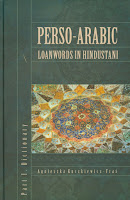 |
| An Arabic translation of a Greek text. |
One of the most underrated joys, at least for me, is noticing the vast amount of cross-cultural sharing that exists in society. Modern views of "Globalism" that resound in the media tend to portray the topic as some mystical development springing from the advent of advanced communication. It's true that the internet has widened the scope of the world for the ordinary man, but cultural exchange has been around since the beginning of time.
Now, some may point out that cultural sharing can be the byproduct of violent colonialism. And that's true. But much of it also developed through other means, such as trade agreements or scholarship. Here are some of my favorite examples of successful cultural exchange.
1. Muslim translators, Greek texts - In the middle of the 8th century the Islamic caliphate began to sponsor translations of Greek texts in regards to science and philosophy. What Europe later deemed "classic" works - those of Aristotle, Plato and Homer among many others - were preserved through Arabic translations. There were two primary reasons for these translations - not only did the caliphate want to compete with its Byzantine neighbors, but it also wanted to gather practical knowledge. Given that scholarship and knowledge was held in high esteem, university education was offered to all, regardless of religion, and the importance of the Byzantine empire, it's not surprising that Greek texts were given an important status.
But the influence of ancient Greek texts didn't stop after the fall of the Islamic caliphate. The influence of Greek philosophy can still be seen today in the muslim world. Ayatollah Ruhollah Khomeini, for example, studied Greek philosophy and was particular to Plato's Republic. Even Taha Hussein, a famous Egyptian writer from the 20th century, translated Sophocles and Greek drama.
 |
| You can buy the book on Amazon. |
2. Language Loans: Hindi - Honestly, Hindi is just one language of many that has been influenced and molded by history. However, I find it extremely fascinating for several personal reasons. First, I found the grammar to be similar to both many Indo-European languages, but also Japanese. Word order and particles are particularly interesting. The detailed vocabulary of familial relations and the verb conjugation based on gender is reminiscent of Arabic. And of course there is the wide gulf of vocabulary that contains loans from Sanskrit, Arabic, Persian, Turkish, Portuguese and English. For anyone who knows one or more of these languages learning Hindi may not only be rewarding, but also an entertaining look into history.
Of course, like I said, Hindi isn't alone in this. You'll find Japanese words in English, German words in Japanese, and Greek words in Russian.
3. Speaking of Japanese, German references in anime is huge. And this European-Japanese combination is not excluded from some classic series. The immensely popular Fullmetal Alchemist parallels 1930s Germany and deals with colonialism and genocide, religion and science. Alchemy itself is a nearly ancient concept that existed in communities from China to Hellenistic Egypt for hundreds of years.
 |
| An example of a quote used from Demain in Utena. |
We can't forget Revolutionary Girl Utena, a series that lifts heavily from Hermann Hesse's novel Demain - not only int he theme of adolescence but also in content. Quotes and images from the work are directly used in the series, only partially paraphrased. References to buddhism are common as well, which isn't surprising. Hesse, even as a German Christian, was obviously influenced by Eastern philosophy and also wrote a brief novel about Siddhartha.
Neon Genesis Evangelion is one more example of a work with German influence. Undertones of Freudian psychology are apparent, and the introduction of a half-German character, Asuka, is another small attempt to make the series more "exotic". And while many religious references shown in the series were used because they looked "cool", the multiple references to the Jewish Kabbalah, Gnosticism, and Christianity, together with the intense storyline with a theme of death and rebirth, causes the series to appear as if the religious symbols are all intentional. If one were to remove the philosophy behind all the symbols from the show, it would certainly seem more empty.
And if we want to broaden the scope of foreign influence on Japanese animation - the American music that informed Cowboy Bebop and Samurai Champloo created unforgettable tracks and characters.
Now all of this doesn't even consider all the multicultural and transnational authors, inventors, artists and leaders who have come out of cosmopolitan societies. But one can imagine that sometimes, a little bit of cultural sharing can create something beautiful.
No comments:
Post a Comment